
Hiring Trends Index: a look at the recruitment landscape of Q3 2023
Table of Contents
- Hiring Trends Index – key findings at a glance
- Top takeaways from the Hiring Trends Index Q3 2023
- The last three months
- Recruitment in Q4 2023
- Sustainability, green jobs and green skills
- Candidate and employee expectations on sustainability
Totaljobs Hiring Trends Index rounds up the latest quarterly insights from the UK labour market and provides a first look at what’s happening in recruitment. In this edition, we look at the third quarter of 2023 with a focus on sustainability and green roles.
The Q3 2023 edition of our Hiring Trends Index takes an in-depth look at insights from 1,011 HR experts and 2,027 adults (18+) employed part-time and full-time in the UK. This instalment has a focus on sustainability and green jobs; looking at how many businesses are hiring for green roles and candidate attitudes toward green employers.
Hiring Trends Index – key findings at a glance
The UK labour market has been loosening throughout 2023, with more people looking for work due to the rise in cost of living. Vacancies have also been falling consistently and have fallen below the million mark for the first time in two years.
Most recently, unemployment in the UK reached 4.3%, which is higher than the Bank of England’s prediction for Q3. Until last month, employment was steadily going up in the UK. However, the September data release from the ONS showed a decline in employment levels.
Positively, after fourteen consecutive rate hikes, the inflation rate is slowly coming down. Additionally, ONS data showed that wages in the UK have finally caught up with the inflation. Our results from Hiring Trends Index Q3 show that businesses continue hiring, and few plan to let go of staff.
Top takeaways from the Hiring Trends Index Q3 2023
- 80% of businesses recruited in Q3 2023, consistent with the previous quarter (81%). Vacancies have dropped below a million for the first time in two years, but still remain above pre-pandemic levels.
- More than a third (36%) of businesses increased recruitment in the third quarter of 2023, slightly more than Q2 2023 (34%).
- The average time to hire increased from 5.8 weeks in Q2 to 6.1 weeks in Q3 but it’s shorter than the beginning of the year (6.4 weeks).
- 59% of businesses are confident they will recruit the people they need in Q4 2023 – which is higher than Q2 2023 (57%) and rising from 53% reported in Q4 2022.
- According to Totaljobs data, despite a general slowdown in hiring, the demand for green roles continues to increase (677% between 2019 and 2023).
- Over 1 in 5 (23%) companies are increasing the number of green roles within their business.
The last three months
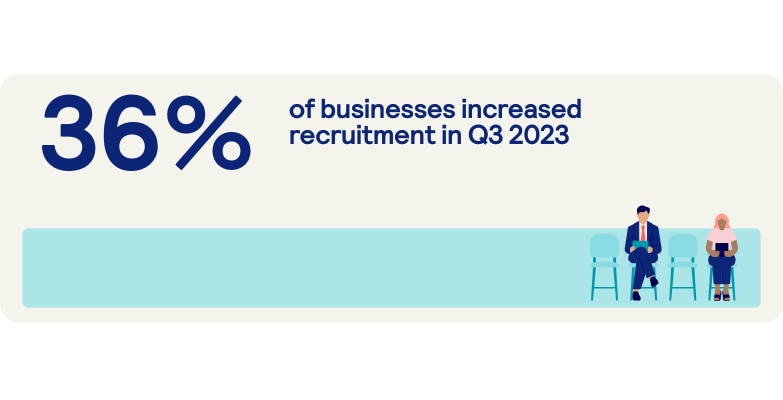
80% of businesses recruited in Q3 2023, and over 1 in 3 (36%) of those who hired increased recruitment. Companies are looking for talent and are willing to increase wages to either attract or retain their employees.
After 18 months of negative wage growth, wages in the UK have finally caught up with the inflation. However, regular pay only rose by 0.6% year on year when adjusted. Pay is still front of mind for talent, so it’s important for employers to benchmark their salaries and compensation packages.
Our Salary & Benefits research found that candidates are looking for work-life balance and prioritising flexible working hours (44%), financial bonuses (37%) and additional holiday leave as perks.
Due to the cost of living, the number of economically inactive has been declining. As a result, the average time to hire has come down from 6.4 weeks with more people looking for work. It currently stands at 6.1 weeks, which is slightly higher than the last quarter (Q2).
Unfortunately, those who are economically inactive due to long-term sickness continue to rise – with the latest figures showing 2.6 million people out of the workforce.
More people looking for work meant that the unemployment rate jumped to 4.3% (Q3) from 4% (Q2). Open vacancies remain at high levels, pointing to a mismatch of available opportunities and candidates.
Businesses also continued to hire temporary staff, freelancers or contractors (17%) at the same rate as the previous quarter. More businesses restructured a department, team or wider business in Q3 (24% vs. 19%).
Similarly to Q2, businesses that recruited in Q3 2023 were most likely to hire for Operations (31%), Technology/IT (26%), Sales (23%), and Customer Service (19%) roles.
Recruitment in Q4 2023
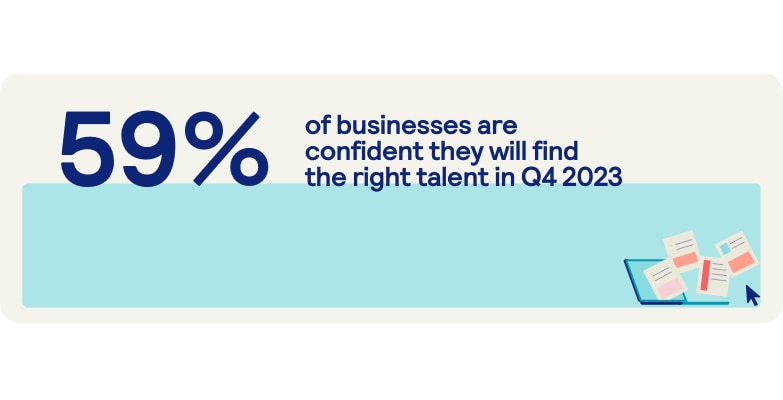
Despite some difficulties within the labour market, business confidence remains healthy. The majority (59%) of employers still feel confident about recruiting the people they need in the last quarter of 2023.
26% of businesses plan to increase recruitment in Q4 2023, with Transportation & Distribution (36%), Real Estate (36%), Medical & Health Services (35%), Finance & Accounting (32%), IT & Telecoms (31%) being the most likely industries to increase hiring.
Of those who plan to hire, almost 1 in 5 (19%) say they will increase recruitment spend for specialist roles. Meanwhile, 13% plan to hire more temporary workers, freelancers or contractors.
The loosening labour market and slowdown of the inflation rate are likely boosting business confidence. At the same time, the ONS released some welcome news about the UK’s GDP performance during the Covid-19 pandemic in the last month of Q3.
According to the revisions, the UK economy grew more than previously thought at the end of 2021 and the GDP revision increased UK GDP by almost two percent. This bumped the UK economy’s position among the G7 countries. However, the growth is still low, just over 0.6 percentage points than the pre-pandemic period.
In the coming months, wage growth and the inflation rate are both expected to come down. After fourteen consecutive interest rate hikes, The Bank of England skipped one in September. This was the first time interest rates remained unchanged since November 2022.
Sustainability, green jobs and green skills
As the climate crisis continues to be a crucial topic of discussion for governments, businesses and individuals alike, there is more demand for green jobs now than ever.
According to ONS data, between 2020 and 2021, low carbon and renewable energy economy (LCREE) turnover increased by 30.8% and employment increased by 16.4%
There is an increasing demand for green roles, which can be seen clearly in Totaljobs data as well. Since 2019, there has been a 677% increase in top sustainability-related roles; such as sustainability manager, engineer or consultant.
In addition, we found that job descriptions across different industries use phrases related to sustainability 80% more on average. The most common phrases included in job descriptions are climate change, green, corporate social responsibility, sustainability, carbon footprint, carbon neutral, environmental and sustainable.
We found that almost 2 in 5 (36%) businesses hire for up to 10 green positions, but over half (51%) don’t employ any. Broken down by industries, we see Manufacturing, Construction, Finance & Accounting, Transportation & Distribution, and IT & Telecoms are the most likely to hire for green positions.
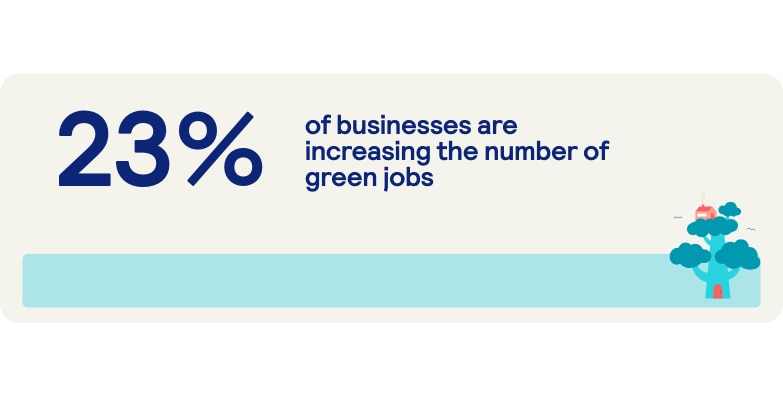
Over 1 in 5 (23%) businesses say they are actively increasing the green roles within their business. This figure goes up to over 2 in 5 (44%) for large businesses.
When it comes to green skills, less than 1 in 5 (17%) businesses currently offer training, despite almost a third (31%) of employers saying their staff is asking for more green skills training.
However, the rising demand for green skills and the pressing importance of green transition mean more people will need these skills. Therefore, 1 in 5 (18%) are providing opportunities for employees to transition into green roles within their business.
Looking at different industries, training for green skills and opportunities to transition into green roles within businesses increase in Manufacturing, Construction, Finance & Accounting, IT & Telecoms, Education, Legal and Transportation & Distribution sectors.
For example, carbon accounting or sustainable investing are green skills employers look for in the Finance & Accounting sector. Similarly, EV skills are getting more prevalent in the Transportation industry.
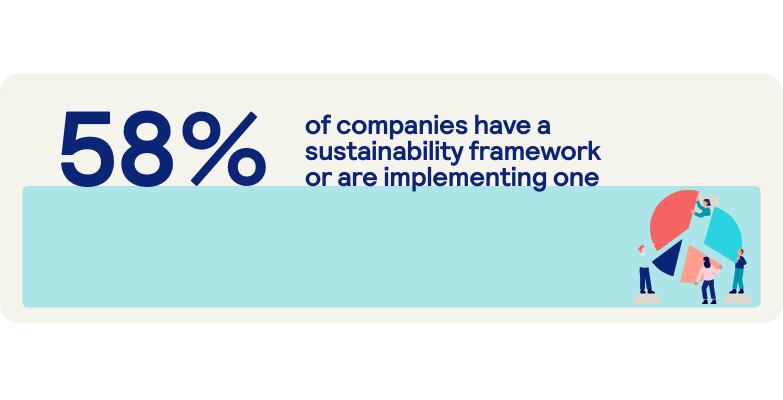
With the increasing relevance of ESG (Environmental, Social and Governance) in determining business risks and return on investment, over half (58%) of companies have or are in the process of implementing a sustainability framework.
There is a business case for operating sustainably and responsibly, as more corporations report on their ESG scores to attract investors, build business relationships, improve financial performance and more.
We see this trend more visibly in larger businesses, with majority (85%) saying they either have or plan to introduce a sustainability framework.
Among businesses that have already established a sustainability framework, 84% of HR decision-makers report that their companies have experienced benefits.
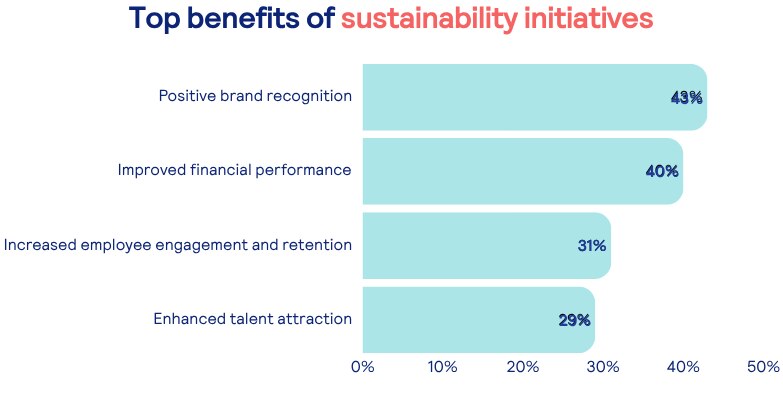
Environmental policy acts like a compass for businesses and investors in becoming green. Therefore, the prime minister’s recent announcements on net-zero targets and policy changes might impact upcoming business decisions. However, it’s clear that the UK’s low carbon and renewable energy economy will continue growing and sustainability will become an increasingly important factor for talent.
Candidate and employee expectations on sustainability
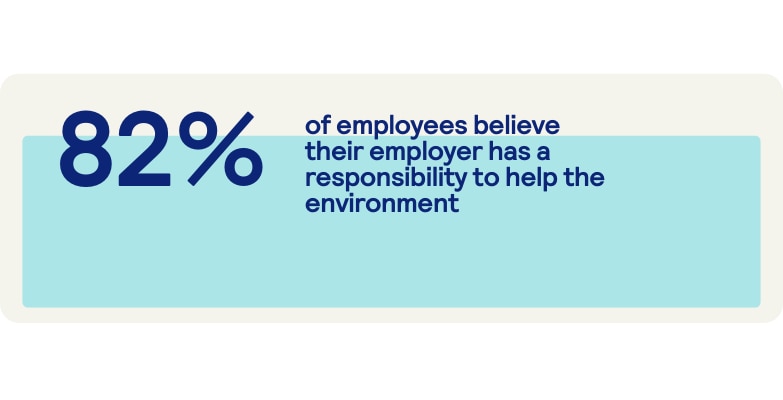
Majority (82%) of employees want their employer to address climate change.
Millennials (ages 27 to 42) currently make up most of the workforce, and they are significantly more eco-conscious than other generations – followed by Gen Z (ages 11 to 26).
61% of Millennials say if a business produced products that were harmful to the environment, they would not apply for a role within that company. Similarly, almost half of (47%) this age group say they specifically look for opportunities with sustainable employers.
Although Millennials are considered more eco-conscious, sustainability is an expectation for workers of all ages. We found that an overwhelming majority (90%) of employees believe their employer has a responsibility to help the environment and would welcome sustainability-related restrictions (such as carrying out business trips only by train, printing quotas, etc.)
Businesses also report hearing more from employees in this regard, as over 1 in 3 (36%) say they have been receiving feedback from employees to increase their efforts in addressing climate change. In addition, a third (32%) report that candidates ask more questions about their sustainability initiatives at the interview stage.
Working for a sustainable business is a motivator for employees, and 4 in 5 candidates say they would have a higher job satisfaction working for a sustainable employer. Some (33%) even leave their jobs to pursue a career with a greater ‘purpose’.
It’s no surprise then, some companies resort to greenwashing since sustainability is becoming a buzzword in employer branding.
Greenwashing
Greenwashing is a practice that organisations use to mislead the public in their environmental efforts to seem more sustainable than they actually are.
However, over half (52%) of candidates say if a potential employer tried to look more environmentally friendly by greenwashing their brand, they would not apply. Positively, almost 3 in 4 (72%) employers feel confident about communicating their environmental initiatives without being accused of greenwashing.
There is opportunity for employers who have sustainability initiatives to attract talent by communicating their efforts as part of their employer branding. Over half (54%) of candidates currently report difficulties learning about the sustainability of companies.

Environmental policy is a roadmap for businesses and investors looking to embrace sustainability. Therefore, the prime minister’s recent announcements on net-zero targets and policy changes might impact upcoming business decisions.
However, despite this, it’s evident that the UK’s low carbon and renewable energy sector will sustain its growth, making sustainability a pivotal aspect for attracting talent.
Not only is there a wider societal and environmental need to go green, but it could help attract and retain talent as candidates become more aware of ESG importance.
For employers facing difficulties in sourcing talent within competitive timelines, showcasing your sustainability initiatives isn’t just a tool to enhance your employer branding; it’s a compelling incentive for candidates to seriously consider your organisation.
Julius Probst, Labour Economist
Totaljobs – Your hiring solution partner
Work with an industry-leading hiring solutions provider that understands your challenges. Part of the global recruitment technology company The Stepstone Group, Totaljobs is a cutting-edge recruitment solutions partner whose goal is to find the right job for everyone. Find the right people for your business by reaching wider talent pools, increasing your brand’s visibility and maximising your hiring budget.
HR decision-maker’s sample
All figures, unless otherwise stated, are from YouGov Plc. Total sample size was 1,011 HR decision-makers. Fieldwork was undertaken between 21st September – 1st October 2023. The survey was carried out online. The figures have been weighted and are representative of business size.
Candidate survey sample
This study focuses on exploring candidate sentiments toward employers and sustainability. The survey was conducted by Totaljobs between 6 – 14 April 2023. The sample consisted of 2,027 respondents who work full-time or part-time in the UK (aged 18+).
Explore articles
Receive the latest recruitment resources and
advice to boost your hiring
By providing us with your details you agree to our privacy policy and for us to keep you updated with the latest news, events,
and special offers from Totaljobs.






